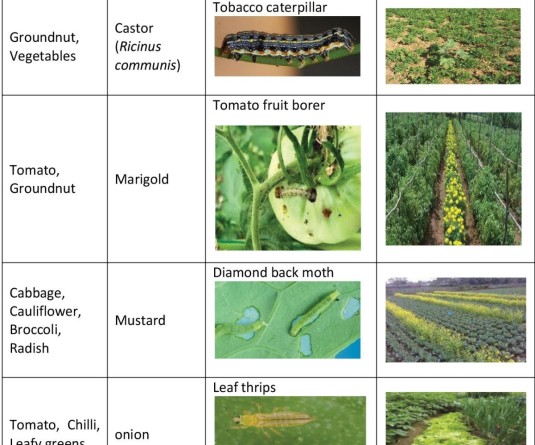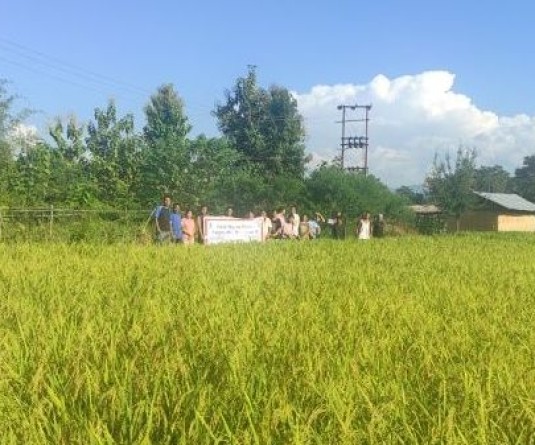
General Advisory
1. Apply light and frequent irrigation / sprinkler irrigation in the evening hours to protect the crops from cold injury.
2. Cover banana bunches with porous polythene bags.
3. Keep cattle inside the sheds during night and provide dry bedding to protect them from cold.
4. Increase protein level and minerals in the feed concentrate to keep the animals healthy to cope up with the cold condition.
5. Give animal’s mineral mixture along with salt regularly and also wheat grains, jaggery etc. @ 10%-20% in the daily ration during winter season to meet the energy requirement of the animals.
6. In Poultry, keep the chicks warm by providing artificial light in the poultry sheds.
Poultry –
Winter is vulnerable period for poultry so proper care should be taken.
1. Lighting:
a) Broilers - 23 hours light and 1 hour darkness may be provided.
b) Layer birds - 14-16 hours of bright light is required for peak production.
2. Warmth and dryness:
a) Keep the chicks warm by using high watt filament bulbs.
b) Floor and litter material should be dry. If possible put in a fresh batch of deep litter atleast 6 inches deep for the winter months.
c) Brooders for chicks should be properly maintained.
3. As daylength is reducing, there will be a fall in egg production. To reduce the effects of reduced day length on egg production, artificial lighting should be installed. Only low wattage lights are needed, a single 25 to 40 watt bulb on before sunset and off at about 10 pm is sufficient.
4. Due to the change in weather preventive steps should be taken up for ranikhet disease. Vaccinate the poultry against prevalent disease like Ranikhet disease and deworm every two months for backyard and intensive system both. BE ALERT for noticing sudden colour and consistency changes in dropping. Look out for change in the sounds made by birds. Indigenous immune boosters like turmeric (haldi) may be added in feed from time to time.
5. Deworm and vaccinate on schedule.
Piggery
Piglets require special attention and care during winter. Provide warm bedding material to the piglets. Piglet diarrhoea should be treated immediately as piglets are highly susceptible to cold shock and dehydration. Keep the floor dry at all times.
1. Provide protection from direct cold wind blasts/drafts.
2. Avoid feeding cabbage leftovers without properly cooking.
3. Kitchen/ hotel/ market waste should be boiled in hot water for atleast 45 minutes before feeding.
4. Disinfect pig shed after washing away all debris with water. KMnO4 (Potassium permanganate/Phenyl may be used.
5. If African swine fever is prevalent in the locality it is good to use specific disinfectant such as viroxide or sodium hypochlorite.
6. Provide sufficient clean water daily for drinking.
7. Deworm and vaccinate on schedule.
Fishery – Jyotish Barman
Due to decrease in water level and temperature during winter months, culture fish comes under stress and are vulnerable to several diseases. In order to maintain a good health, it is necessary to keep the pond clean and maintain optimum water quality. The following measures should be taken.
1. Apply lime after testing the soil and water to maintain optimum pH and as prophylactic treatment. Alternatively for one bigha pond area, mix 10 kg agricultural lime with 1 kg powdered turmeric and apply into the pond.
2. If there is deposition of organic waste in the pond bottom, it has to be removed.
3. Remove aquatic weeds from the pond as well as embankment.
4. Washing of clothes and utensils, bathing of human and animals should be avoided.
5. Discourage entry of birds and animals into the pond as they may carry germs detrimental to fish.
6. Care should be taken that fish are not injured. If injured, the fish should be dipped in 1 mg/litre potassium permanganate solution for one minute before releasing into the pond.
7. Diseased or moribund fish should be mixed with lime and buried in a pit at a distance from the pond.
8. If the pond has sufficient water (minimum 6 feet depth), then feeding @ 2 kg/bigha/day should be continued. Ponds in which water depth has drastically reduced, it is advisable to harvest the entire lot.
9. If there is algal bloom on the pond surface, suspend feeding and manuring immediately for 15 days.
10. Since, water level usually declines during water months, fish of bigger size should be harvested to reduce the stocking load.





